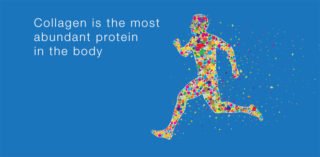British tennis star Sir Andy Murray is taking super-strength collagen in a liquid supplement form to strengthen his joints, bones, and immune system. The super-strength collagen is part of his overall recovery program. Murray made his singles comeback in August, just seven months after he announced that he thought his career was over.
Andy Murray Goes Public on his Super Strength Collagen Use
Murray announced on social media: “I am pleased to announce my latest partnership with TRR Nutrition, who today launched the TRR Advanced Collagen Supplement. The supplement has been designed by Dr. Eva Carneiro and my nutritionist, Glenn Kearney, and it is fully Informed Sports tested, so it’s great for athletes.”
TRR Advanced Collagen contains 10,000mg of marine collagen, turmeric, ginger, hyaluronic acid, glucosamine, copper, and vitamin C, all of which support my bone and joint health, which means I can push myself harder on the court and in the gym.
Murray’s team came up with a 50ml supplement that contains 10,000mg of high-strength marine collagen, plus glucosamine. This is a compound found naturally in the body which helps keep the joints healthy and delays the breakdown of cartilage, improving mobility. Studies also claim it can also ward off diabetes and extend lifespan if taken regularly.

What is Collagen, Super Strength collagen?
Collagen is a protein that our body has in abundance. This protein can be found in our bones, muscles, skin, and tendons. It provides strength, rigidity, and resistance in our bodies. This is the reason for our bouncy skin and resilient joints in our youth. However, as we enter our 20s, we begin to lose out naturally on protein. Approximately between 1 and 1.5% annually. Along with that, we also start to lose out on the benefits of a collagen-rich body concurrently.
From the age of 20 (yes, that young), we start to lose collagen from 1% annually. It’s around then, or closer to when wrinkles start to show that many turn to cosmetic procedures, supplements, and facial products in hopes of reversing the signs of aging. It figures that previously, many have taken various approaches in hopes of restoring the lost collagen in their skin in hopes of avoiding wrinkles, fine lines, and other signs of aging.
The Science Behind Collagen
Scientists believe that consuming collagen – fabled for eliminating wrinkles – keeps skin, hair, and nails looking younger, but importantly will also help the body recover quicker after exercise and prevent injury.
According to a study produced in the journal Nutrients earlier this year, collagen helped speed up a return to running in people with Achilles tendon problems. The study revealed that collagen also protects the body against joint and back problems.
The growing awareness of collagen is translating directly into sales. An expected amount of $122 million worth of products that include collagen is consumed by American consumers. This number is increasing by up to 30% annually.
Does Collagen Work?
The demand for collagen for anti-aging purposes is growing even though the science is still in its infancy, as are the regulations on the products.
Consuming foods that are rich in protein assists your body in producing amino acids. The body in turn uses this to synthesize collagen. However, if your diet does not feature enough vitamin C and/or iron, this can disrupt the natural production of collagen. Amino acids have therefore meant big business for companies. There are more than a dozen types of collagen replacement products and supplements, each composed of different “peptides” or amino acids. These products, depending on the nature of the remaining ingredients in the product, may help you regenerate collagen.
Types of products that include collagen
Collagen comes in different types. There are the five most common types: type I, II, III, V, X. Each serves a different purpose in the body.
Most people are consuming the wrong types of collagen, and see little to no benefit at all. Importantly, it can be extremely difficult to increase the right type and proportion of collagen in your body to gain all the amazing benefits. You need five different types of collagen in particular to experience powerful results. However, bone broth and so many of the supplements, like gelatin and collagen powder, only provide you with one or two types at most.
- I: skin, tendon, vasculature, organs, bone (the main component of the organic part of the bone)
- II: cartilage (main collagenous component of cartilage)
- III: reticulate (main component of reticular fibers), commonly found alongside type I
- IV: forms basal lamina, the epithelium-secreted layer of the basement membrane
- V: cell surfaces, hair, and placenta
Products typically contain either chicken or bovine collagen. Occasionally added are vitamins and minerals. Usually added are Flow agents, anti-caking agents, and sometimes flavorants. In an attempt to further make products more appealing, many collagen products are incredibly high in sugar.
Collagen, Super-Collagen Protein Food Products
Different types of collagen, as previously listed, come from skin and tendons as opposed to cartilage. You can now get tasteless collagen protein food products that contain all the necessary ingredients in order to capture collagen.
Types I and II are really important types of collagen to get to know of. These are the types to want in your collagen. Both collagen types I and II are produced by osteoblasts and fibroblasts, which are cells located in our connective tissues and cells that create bones respectively.
Types I and II are more often than not grouped together. 90% of the total collagen in our bodies contains these two types. Plus, these two types of collagen serve plentiful purposes. They are of great importance when it comes to the maintenance of the skin, nails, bones, hair, and muscles.
“Collagen supplements only work if the molecular size and hydrolysing process make it possible for the body to absorb them. Stomach acidity also plays a role in the bio-availability of the product. Therefore, it is necessary for a product to show effectiveness with their own studies and one cannot rely on the general studies of how effective collagen supplementation is. Each product needs to prove its own effectiveness as this is really important with collagen supplements.
This is not the same for all supplements, some supplements are easily absorbed and are effective, but not collagen. The quality of the collagen products plays a very big role.”
Using Collagen for Cosmetic Solutions
In order to correctly and effectively obtain collagen, a close ingredient watch is absolutely necessary. Above which, when looking for collagen replacements in the skin to fight signs of aging by means of fine lines and wrinkling, look for companies that get their bones and tissues from cage-free, free-range, and antibiotic-free sources. In addition, companies that have conducted their own research for their own product containing
One of the main issues with most supplements that claim to help completely replace collagen in the body – and reverse aging, strengthen joints, promote and improve hair growth, and the general appearance of hair – don’t always contain the types of collagen that do so. In fact, a lot of these off-the-shelf and well-advertised supplements do not even contain complete proteins. This means that taking these supplements, irrespective of how religiously you take them, will not provide you with the full benefits of taking collagen that complete proteins are able to provide. What’s more, most collagen and bone broth powders don’t dissolve well in cold or room temperature liquids, leaving a coagulated, clumpy mess at the bottom of your glass that’s unpleasant to drink.
Products that contain type I collagen are also key. This type targets the skin, tendon, vasculature, organs, and bone. Type I works well at replenishing the skin. Clinical trials in patients who supplemented with Type I collagen showed enhanced skin hydration and firmness, as well as a decrease in wrinkles.
Collagen Crazes
Now that collagen has become a household name, products with collagen are popping up all over. Take collagen water. The product is making a major splash with many established health companies and food chains hopping on board. Collagen water comes in many subtle flavors. According to Collagen Water, “The amino-acid content of hydrolysed collagen is the same as collagen. Hydrolysed Collagen contains 20 amino acids, including 8 out of 9 essential amino acids (there is no tryptophan). The predominant amino acids in hydrolysed collagen are glycine, proline, and hydroxyproline, which represent around 50% of the total amino acid content. Glycine and proline concentration is 20 times higher than in any other proteins.” This is a good way to get your daily collagen in your take whilst remaining hydrated.
In Your Morning Cups Of Tea Or Coffee…
Swapping out your milk with collagen-infused milk powders and milk collagen lattes. To add sophistication and convenience, non-dairy options are also available. You can just pop them in your morning tea or coffee. Most of these products contain bone broth (a natural source of collagen). This key ingredient will therefore n0t only help achieve anti-aging benefits of the protein, but also assist with elasticity, as well as nail and hair strength. The downside to the majority of these powders is that they are incredibly high in sugar. So watch out!
Other Ways To Include Collagen
Fish oil in the form of capsules or liquid, as well as zinc. Vitamins A, C, and E are also great for collagen promotion. Hyaluronic acid is a compound that is incredibly rich in collagen. Foods such as beans, root vegetables, and soy that are incredibly rich in amino acids all contain hyaluronic acid.
Getting enough sleep is important when it comes to your body’s collagen production. Sleep is the time the body uses to restore and repair itself, and if we do not get enough sleep – for at least 7 to 8 hours – it limits the body’s capability to produce collagen. Lack of sleep can increase your stress levels, which can lead to skin problems such as the breakdown of collagen.

Super Strength Collagen for Athletes
Super strength collagen like the one Murray is using, is finding favour with athletes and fitness fanatics trying to aid recovery and performance.
Murray’s nutritionist, Glenn Kearney, is well qualified in this regard. He believes in the power of super-strength collagen. He worked with supplement firm, Nutraformis, to create the collagen drink, especially for Murray.
Kearney is a leading sports nutritionist with years of experience working alongside top-ranked athletes, including three-time Grand Slam tournament winner and two-time Olympic gold medallist Andy Murray. From January 2003 until February 2008, Glenn worked as the lead nutritionist for the All Blacks, the New Zealand national rugby union team. Following his success with the All Blacks, Kearney moved on to become a Lead Nutritionist at both UK Athletics and the Lawn Tennis Association, where he was part of the 2015 World Champion Davis Cup team.
Other Recovery Properties
Anti-inflammatories ginger, turmeric, and copper can also reduce joint stiffness and help maintain a healthy immune system. These include Vitamin C and hyaluronic acid, which have been proven in trials to speed up wound healing, increase energy, and improve muscular strength and mental alertness. Together all have been combined into the cherry-flavored drink.



![women [longevity live]](https://longevitylive.com/wp-content/uploads/2020/01/photo-of-women-walking-down-the-street-1116984-100x100.jpg)










